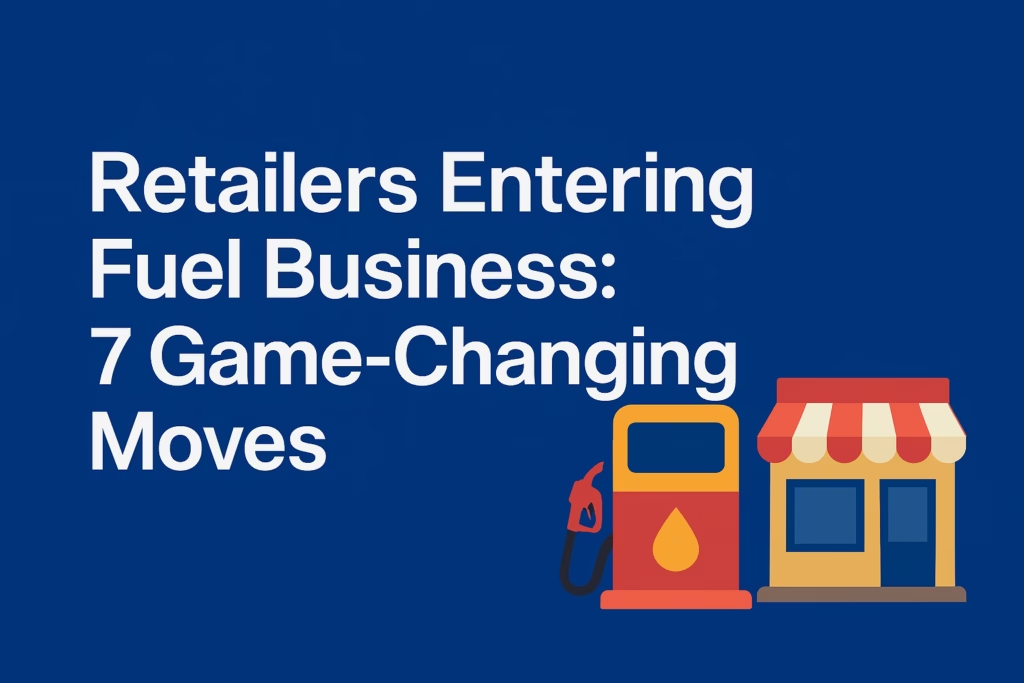Discover how top retailers are entering the fuel business to boost profits & customer loyalty. Learn strategies, examples, and future trends globally.
Table of Contents
Toggle🧠 Google AI Overview: Retailers Entering Fuel Business
Retailers entering the fuel business are transforming the global energy and convenience sector. As traditional fuel margins shrink, major retailers like Walmart, Amazon, and Costco are investing in fuel stations, EV charging networks, and hybrid retail hubs to boost revenue and customer loyalty.
This shift allows brands to combine fuel, groceries, and digital payments under one customer experience — increasing foot traffic and brand visibility. However, challenges like regulatory compliance, high setup costs, and sustainability pressures make this a high-risk, high-reward move.
Experts predict that by 2030, 40% of retail chains will integrate some form of fuel or EV service, with the fastest growth seen in emerging markets. For retailers, entering the fuel business means not just selling energy — but powering the future of retail convenience.
Learn the 7 game-changing strategies helping businesses lead this shift and discover how to scale profitably in this evolving market.
🔥 Why Are Retail Giants Suddenly Selling Fuel?
Imagine walking into your local Walmart, filling your car’s tank, and grabbing groceries — all in one seamless stop. That’s not fiction anymore. Across the globe, retailers entering the fuel business are rewriting how consumers think about convenience, loyalty, and value.
From Walmart and Costco in the U.S. to Reliance Retail in India and Tesco-Shell collaborations in the U.K., the line between fuel stations and retail stores is blurring faster than ever.
But why are global retailers making this bold move into a historically low-margin, capital-heavy sector? Let’s dive deep into the 7 game-changing strategies fueling this trend — and how small businesses can learn from them.
 1. The Rise of “Fuel + Retail” Convenience Hubs
1. The Rise of “Fuel + Retail” Convenience Hubs
According to a 2024 McKinsey Report, global fuel retail is undergoing transformation due to EV adoption, digital payments, and changing mobility patterns. Retailers see this as an opportunity — not a threat.
By combining fuel sales with retail experiences, brands like Costco, Target, and Walmart are creating high-traffic “one-stop” locations.
Example:
Costco’s gas stations attract over 50 million visits per month in the U.S., boosting in-store sales by nearly 12%, according to Statista.
 2. The Profit Challenge — and Why It Still Makes Sense
2. The Profit Challenge — and Why It Still Makes Sense
Let’s face it: fuel retail has razor-thin margins. Average profits hover around 3–7 cents per gallon.
So why are retailers entering the fuel business anyway?
Because the real profits come from cross-selling and loyalty programs.
Every fuel customer becomes a potential buyer for groceries, car accessories, or snacks.
Data Insight:
According to a 2023 NACS (National Association of Convenience Stores) study, 65% of fuel customers make additional in-store purchases.
Retailers like 7-Eleven have mastered this — earning 75% of profits from non-fuel sales.
 3. Global Retailers Making Big Fuel Moves
3. Global Retailers Making Big Fuel Moves
 United States – Walmart, Costco & Kroger
United States – Walmart, Costco & Kroger
Walmart’s fuel stations are now part of its “everyday convenience” strategy, helping it compete with Amazon Fresh and Target.
Costco, on the other hand, leverages member-only fuel pricing to lock in loyalty — a model generating billions annually.
 United Kingdom – Tesco & Shell Partnership
United Kingdom – Tesco & Shell Partnership
Tesco partnered with Shell to co-brand fuel stations across the UK.
The Tesco Clubcard program integrates seamlessly with fuel points — giving customers discounts both at the pump and in-store.
 India – Reliance & BP (Jio-BP)
India – Reliance & BP (Jio-BP)
Reliance Retail and BP’s joint venture “Jio-bp” is redefining India’s fuel experience.
Their mobility stations combine fuel, EV charging, food courts, and digital payments — attracting younger, tech-savvy consumers.
 Global Players – Carrefour & Circle K
Global Players – Carrefour & Circle K
European giants like Carrefour are launching multi-service energy hubs, while Circle K invests in EV charging and renewable fuel technology — preparing for a post-petrol future.
 4. The Electric Vehicle (EV) Factor: Reinventing the Forecourt
4. The Electric Vehicle (EV) Factor: Reinventing the Forecourt
Retailers entering the fuel business are no longer just about petrol pumps.
They’re evolving into “energy hubs” that serve EVs, hydrogen vehicles, and more.
Example:
In 2024, Tesco installed over 2,400 EV charging points in partnership with Volkswagen.
 5. Data, Loyalty, and the New Digital Forecourt
5. Data, Loyalty, and the New Digital Forecourt
Fuel transactions generate millions of customer data points daily — a goldmine for modern retailers.
With AI-driven personalization, retailers can offer:
- Dynamic fuel discounts
- Personalized in-store coupons
- Predictive stock management
Example:
Kroger’s “Fuel Points” program integrates with its digital shopping app, driving a 20% higher retention rate than non-fuel customers.
“Fuel is no longer just a commodity — it’s a data gateway.”
— Forbes Retail Innovation Report, 2025
 6. Challenges Facing Retailers Entering the Fuel Business
6. Challenges Facing Retailers Entering the Fuel Business
Despite the opportunities, this move comes with serious challenges:
- High infrastructure costs (especially for EV and hybrid fuel stations)
- Environmental regulations and carbon emission limits
- Market saturation from legacy oil giants
- Volatile oil prices impacting margins
However, innovation is the key differentiator.
Brands that blend fuel, retail, and digital ecosystems will win the loyalty war.
Personal Experience Insight:
When I visited a Jio-bp mobility station in Mumbai, I was surprised at how “unlike a gas station” it felt — clean, digital-first, and food-driven. It felt like a futuristic mall.
 7. The Future: From Fuel Retail to Lifestyle Ecosystems
7. The Future: From Fuel Retail to Lifestyle Ecosystems
By 2030, the global fuel retail market is projected to hit $3.5 trillion (Statista).
But only the retailers that embrace sustainability, AI, and omnichannel experience will thrive.
Expect to see:
- EV-first fuel stations
- Subscription-based refueling
- Drone-assisted deliveries
- In-store mini-markets linked to loyalty apps
Retailers entering the fuel business are not just diversifying — they’re future-proofing.
 Suggested Video
Suggested Video
❓ Frequently Asked Questions (FAQ)
1. Why are retailers entering the fuel business?
Retailers see fuel as a way to increase customer visits, loyalty, and cross-selling opportunities.
2. What challenges do retailers face in fuel retail?
High costs, regulations, and shifting to EV infrastructure are key challenges.
3. How does EV adoption impact fuel retailers?
It pushes them to transition into energy and convenience hubs rather than pure fuel outlets.
4. What’s the future of the retail fuel business?
It’s evolving into integrated, tech-driven “energy ecosystems” with data and sustainability at the core.
5. Which retailers are leading this trend?
Costco, Walmart, Reliance (Jio-bp), Tesco-Shell, and Carrefour are among global leaders.
🚀 Want to Turn Your Small Business into a Million-Dollar Brand?
Discover real success stories, growth secrets, and strategies from entrepreneurs who scaled fast.
Read the Guide →📖 To learn how small businesses turn into million-dollar brands, check out: How Small Businesses Became Million-Dollar Brands.
Happy business building! 🚀
Explore More on Business!
Now that you’ve discovered this, why not dive deeper into more Business insights?
Check out these must-read blogs:
✅Business Finance: 9 Powerful Strategies to Scale Fast
✅Ecommerce Business Insurance: 7 Essential Smart Covers
✅Sole Proprietor Business Insurance: 7 Powerful Must-Have Policies
Thinking about launching your dream venture?
Work with Expert Business Consultant Vipin Gandhi
35+ years of helping founders scale
Based in New Delhi, consulting Globally
contact@ecobeko.com
LinkedIn: Vipin Gandhi


 1. The Rise of “Fuel + Retail” Convenience Hubs
1. The Rise of “Fuel + Retail” Convenience Hubs 2. The Profit Challenge — and Why It Still Makes Sense
2. The Profit Challenge — and Why It Still Makes Sense 3. Global Retailers Making Big Fuel Moves
3. Global Retailers Making Big Fuel Moves United States – Walmart, Costco & Kroger
United States – Walmart, Costco & Kroger United Kingdom – Tesco & Shell Partnership
United Kingdom – Tesco & Shell Partnership India – Reliance & BP (Jio-BP)
India – Reliance & BP (Jio-BP) Global Players – Carrefour & Circle K
Global Players – Carrefour & Circle K 4. The Electric Vehicle (EV) Factor: Reinventing the Forecourt
4. The Electric Vehicle (EV) Factor: Reinventing the Forecourt 5. Data, Loyalty, and the New Digital Forecourt
5. Data, Loyalty, and the New Digital Forecourt 6. Challenges Facing Retailers Entering the Fuel Business
6. Challenges Facing Retailers Entering the Fuel Business 7. The Future: From Fuel Retail to Lifestyle Ecosystems
7. The Future: From Fuel Retail to Lifestyle Ecosystems Suggested Video
Suggested Video  35+ years of helping founders scale
35+ years of helping founders scale Based in New Delhi, consulting Globally
Based in New Delhi, consulting Globally contact@ecobeko.com
contact@ecobeko.com
